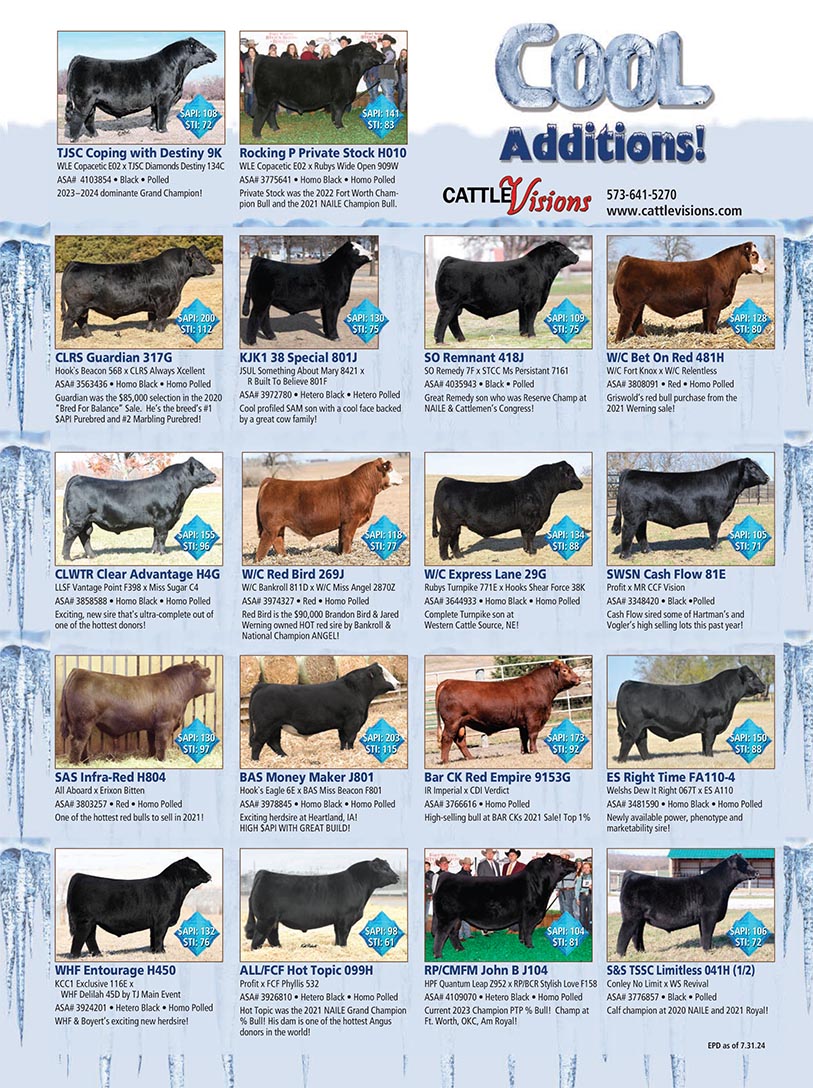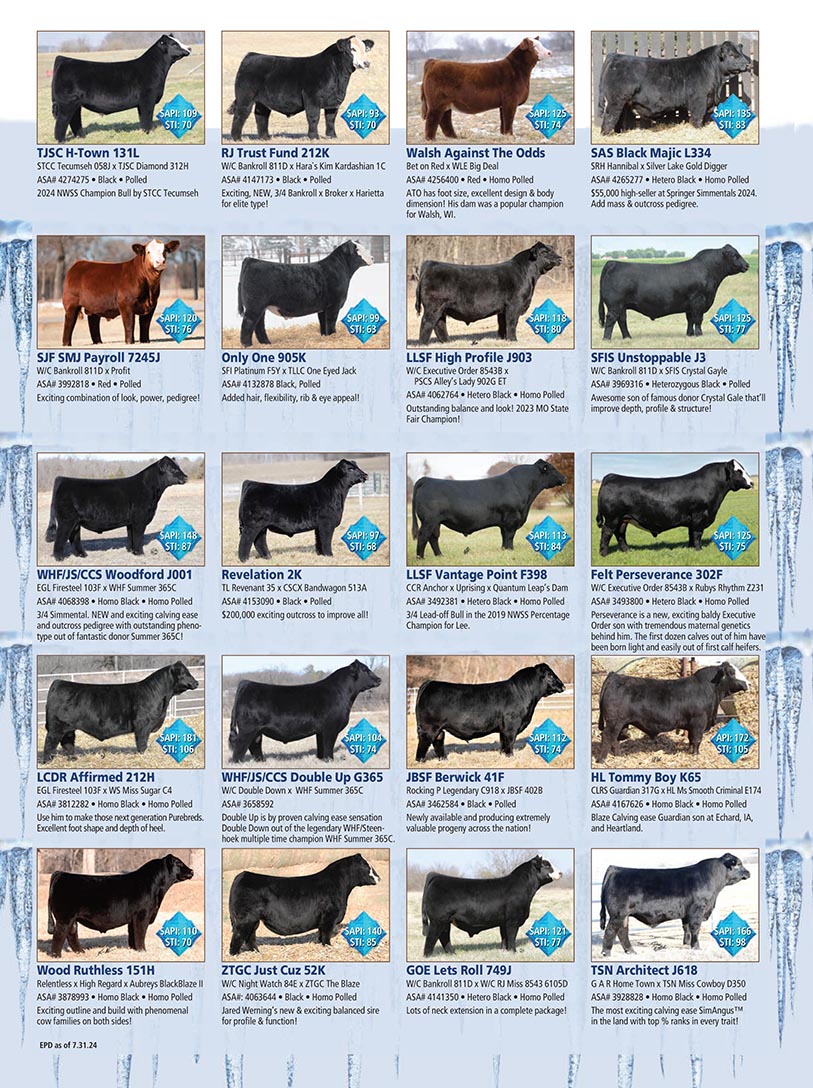
7 minute read
Utilizing DNA Testing and Genomics to Select Replacement Females
by Lane Giess, ASA Geneticist
Have your commercial customers asked you about utilizing DNA testing and genomics to help in the selection of replacement females? What are their options and how do they compare in terms of offerings and cost?
Being able to identify replacement heifers with greater precision should be a top priority of commercial cattle producers. There are many economically relevant traits that simply can’t be observed with your eye, and even heifers that are sired by your best bull may inherit some poor genetics. Traits such as mature cow size, longevity, fertility, growth, and terminal merit are all traits that are greatly influenced by an animal’s genetics, and in an industry with thin margins, developing heifers with poor genetics for these traits can have lasting financial repercussions. However, for many years, genetic improvement for commercial herds was generally limited to selecting a superior bull from a seedstock provider and hoping that the progeny he sired were more genetically advanced than the average of your cow herd. We’ve seen over the years that genetic progress in the beef business is slow, especially if the genetically superior bull you purchased turned out to be a “dud.” Improvements in statistical methods, computing power, and integration of genomic information from DNA has greatly improved the precision of genetic evaluations so that when you do make a bull buying decision you can have greater confidence that bull will produce as expected.
The utility of genomic testing is a complete gamechanger to the beef business because of the vast amount of information it provides on an animal before they ever have progeny, and is the reason why no commercial producer should be buying yearling bulls unless they are genotyped. Over the past decade, genomic technology has been improved and leveraged to greatly benefit the seedstock industry, but these products have even started to bleed over into the commercial sector. So, the original question was “how can I utilize DNA testing to better select replacement females?” The first answer is to buy genetically superior, genomically enhanced expected progeny differences (GE-EPD) bulls. But that answer lacks the precision we mentioned earlier, so the second answer is to also incorporate commercial DNA testing and genetic evaluation into your breeding program. Yes, there are numerous commercially available products that provide opportunities for genomic improvement in commercial cow herds. This article will focus on three prominent commercial genetic evaluation programs: the
Zoetis INHERIT Select, the Neogen IGENITY Beef, and the American Simmental Association (ASA) Cow Herd DNA Roundup (CHR) and Calf Crop Genomics (CCG) programs. Each program is slightly different, but can drastically improve your understanding of genetic merit among your cow herd and replacement females and allow you to be more informed in your selection and breeding decisions, better benchmark your herd’s genetic strengths and weaknesses, and identify your effective sires through parentage discovery.
Before we get into each of the products, let’s first address the big question: how can genomic testing typically catered for seedstock production be used in commercial herds? The answer is relatively simple. Genomic testing uses a system of identifying high-impact genes for economically relevant traits and variations in the genetic code at those genes, allowing scientists to determine if a specific gene variation is shown to have greater performance than an alternate variation. We call these additive effects, and when you combine all of the high-impact genes for a single economically relevant trait you can start to paint a picture for how an animal’s DNA makeup will translate to their actual performance. All of these genomic tests are backed by millions of data points on straightbred and crossbred animals, so that the genes involved in these DNA products are known locations across breeds. This means that regardless of the breed composition of your cow herd, you can have accurate and reliable multi-breed genetic insights.
The Zoetis INHERIT Select and the Neogen IGENITY Beef products are perhaps the two most similar, as both products are based in providing molecular breeding values and percentile ranks based on an individual animal’s genomic makeup. Both products are easy and simple to use and only require a commercial operator to collect a DNA sample on their animals and send it to the respective lab where results will be processed in a few short weeks. Users will receive a report outlining the relative breeding value, and percentile rank for a number of economically relevant traits on each animal tested. The Neogen IGENITY Beef product costs $30.00 each, and includes 17 maternal, performance, and carcass traits, and also verifies parentage. The IGENITY Beef dashboard where results are displayed allow you to develop your own custom indexes from those traits provided so you can effectively identify females that have balanced trait superiority. The Zoetis INHERIT product promotes various discounted prices with pricing for heifers as low as $14 per test and as low as $29 per test for cows. The Zoetis INHERIT product includes GE-EPD on 20 traits that are updated weekly, including growth, feed to gain, mature cow weight, carcass traits, and cow fertility. Both tests also include the option for add-on tests that could identify homozygosity for polled and coat color.

Of course, there are trade-offs between these products and it is also worth mentioning that commercial cattle genomic testing is still in its relative infancy compared to the seedstock industry. A commercial genomic test like those provided by Neogen and Zoetis undoubtedly provides greater granularity for identifying genetic merit compared to using your eye, but like any genetic prediction, there is still some level of prediction error, and test results may not be wholly indicative of an animal’s true genetic merit. If you want to gain greater accuracy and more precise genetic predictions, it is worth considering collecting and leveraging phenotypic and pedigree data into a genetic evaluation that uses genomic information in tandem with actual data. This is where the ASA Cow Herd DNA Roundup and Calf Crop Genomics programs can provide solutions for commercial operators who collect phenotypic data such as birth weights, weaning weights, or even individual carcass data.
The Cow Herd DNA Roundup and Calf Crop Genomics programs allow commercial operators to pair those information sources with low-cost genotyping in a multi-breed genetic evaluation that can provide additional accuracy and predictive power. These programs encourage users to enroll their entire cow herd or calf crop in the ASA Total Herd Enrollment (THE) commercial option, which costs $7.50 per cow, or a flat fee of $500 (regardless of herd size) if you only want GE-EPD returned on females. The DNA test costs $25 dollars (if you test >90% of herd size) with opportunities to receive credits back if you report data such as weaning and yearling weight, mature cow weight, and body condition score. In return you will receive GE-EPD on 16 economically relevant traits and two selection indexes, along with percentile ranks and prediction accuracies. In these programs you are using the same tools as your seedstock provider to make decisions. Naturally, both programs also come with trade-offs as they are the most data-intensive and demanding of the programs discussed in this article. Users must have sire awareness for this program to be successful, and parentage of females through DNA is a top priority.

Ultimately, the beef business is evolving, and precision tools such as genomic testing to identify genetically superior animals in commercial cow herds are becoming more widely available and incredibly powerful in the information they provide. This article is meant to serve as an introduction to which tools are available to you and provide a fair comparison of each. For additional information visit each of the respective providers’ websites, and if you have further questions, contact lgiess@simmgene.com. .













